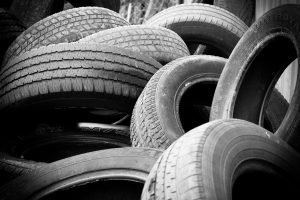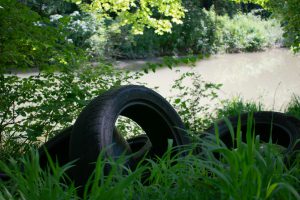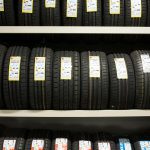How your tyres are recycled
Tyres! They’re an essential part of your vehicle – we wouldn’t be driving anywhere without them. In fact, tyres are so vital for daily journeys, that over 100,000 are fitted to vehicles, every single day. That’s 40 million going onto cars per year, with 3/4 of them being replacement tyres.
So, with so many tyres being installed… where do all of the old ones go?
What are tyres made of?
Tyres are made from a variety of materials. Although premium and budget brands may use different quality materials and techniques, tyres are all typically designed using natural or synthetic rubber as the main textile. It’s often a combination of the two, as together they offer better flexibility, durability, and wear resistance.
Other reinforcing materials are used as filler, often to improve tyre performance and reinforce the rubber’s durability. Such fillers may be carbon black, silica, and oils.
Did you know natural rubber is extracted from certain trees? By recycling your old tyres, you limit the demand for virgin materials and save them for other uses!

Why old tyres matter
It’s important to replace your tyres as they wear down over time. Otherwise, they pose a risk to you, your passengers, and other road users. That’s because rubber degrades and weakens over time, affecting road grip, stopping distance, and overall vehicle handling. Your old tyres are also more likely to have an illegal tread depth (less than 1.6mm), which means you’ll fail your next MOT, may invalidate your insurance, and are more likely to be involved in an accident. When it’s time to replace your tyres, visit your local Halfords garage for expert advice, reliable fittings, and top-quality tyres.
However, just because your old tyres are unsuitable for the road, it doesn’t mean they’re useless. They continue to hold valuable materials and offer further opportunities for use.
The EU has recognised natural rubber as one of its 27 Critical Raw Materials, meaning it is an essential resource. Destroying old tyres is seen as a waste of these important materials, especially as natural rubber is in increasingly high demand. To balance this, recycling old car tyres has become a popular step in working towards a greener future.
The tyre waste problem
Tyres do not biodegrade, so unfortunately, they create environmental risks whether they’re dumped locally or shipped abroad to landfills.
As they slowly degrade, tyres can release chemicals into our soil and water, further polluting the environment. They also pose health risks and fire hazards, as they’re very hard to extinguish and release harmful pollutants into the air.
Due to these valid concerns, sending whole or shredded tyres to landfills is banned in the UK. A win for planet Earth!
As we’ve already explored, destroying old tyres not only ignores their value but also increases the demand for new resources. That’s why responsible tyre waste management is so important! And luckily, there are more than a few ways to do so.

How tyres are recycled
It’s possible to reuse truck tyres and keep them for their initial purpose by re-treading them. If the HGV tyre’s condition passes quality inspections, it’s possible to replace the old tyre tread so that it meets the legal tread requirement of 1.0mm. This process is popular among larger vehicle drivers (e.g. lorries), as it can be cheaper to refurbish than replace.
One of the most popular methods to recycle old tyres is to shred them and turn the rubber into smaller granules. These crumbs can be incorporated into tarmac to improve its durability and reduce road noise. They may also be used in embankments, drainage layers, or soundproofing.
You may have noticed that tyres are also displayed in playgrounds. They’re often repurposed as garden planters and swings, or less obviously, in playground surfaces due to their tendency to flex under impact.
How does Halfords recycle your tyres?
At Halfords, tyre recycling is a high priority, and as industry leaders, we strive to encourage a more sustainable future. Even so, we’re constantly reviewing and evolving our recycling process so that we can be as responsible as possible.
We sell and replace over 3 million tyres per year, which generates 60% of our waste. That’s why we recycle our tyres through two main routes. 35% of our old tyres are set for downcycling. This means that the metals are extracted and the rubber is shredded into chippings. These chippings are used in many ways, including sports pitches, carpet underlay, and equestrian mats.
The remaining 65% of tyres are shredded to become tyre-derived fuel. Here, experts power cement kilns using waste tyres, rather than virgin fuel. From this, new cement is produced and sold to be used in construction throughout the country.
For the commercial truck market, we even offer tyre lifespan expanding services. This means that we can re-tread truck tyres, several times, to safely extend their lifespan on the road.
What can you do to support sustainable motoring?
Although it can seem daunting, there are some key and simple steps you can take to contribute towards greener driving.
Remember to check your tyre pressure regularly, as underinflated tyres can increase rolling resistance and your vehicle may use more fuel. Overloading your vehicle also contributes to increased fuel consumption and can wear down your tyres faster, leading to more replacements. Arranging regular servicing for your car is another way of limiting vehicle emissions and keeping everything running smoothly.
By buying your replacement tyres at Halfords, you can drive away reassured that your old tyres are being recycled responsibly. Maintaining your tyres and vehicle properly means that you’ll limit the need for frequent replacements and keep your carbon footprintu down.
Don’t forget that by signing up to Halfords Motoring Club, you’ll receive a £5 welcome voucher to be used on your next set of wheels. Or upgrade to premium for £10 and 5% off, as well as many more exclusive benefits.



